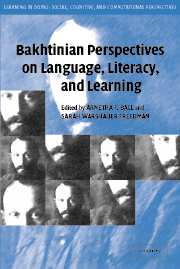Book contents
- Frontmatter
- Contents
- List of Contributors
- Acknowledgments
- PART I IDEOLOGIES IN DIALOGUE: THEORETICAL CONSIDERATIONS
- PART II VOICED, DOUBLE VOICED, AND MULTIVOICED DISCOURSES IN OUR SCHOOLS
- PART III HETEROGLOSSIA IN A CHANGING WORLD
- 9 New Teachers for New Times: The Dialogical Principle in Teaching and Learning Electronically
- 10 Is Contradiction Contrary?
- 11 A Bakhtinian Perspective on Learning to Read and Write Late in Life
- 12 New Times and New Literacies: Themes for a Changing World
- Voices in Dialogue – Hybridity as Literacy, Literacy as Hybridity: Dialogic Responses to a Heteroglossic World
- PART IV A CLOSING THOUGHT ON BAKHTINIAN PERSPECTIVES
- Author Index
- Subject Index
- Titles in the series
- References
12 - New Times and New Literacies: Themes for a Changing World
Published online by Cambridge University Press: 24 May 2010
- Frontmatter
- Contents
- List of Contributors
- Acknowledgments
- PART I IDEOLOGIES IN DIALOGUE: THEORETICAL CONSIDERATIONS
- PART II VOICED, DOUBLE VOICED, AND MULTIVOICED DISCOURSES IN OUR SCHOOLS
- PART III HETEROGLOSSIA IN A CHANGING WORLD
- 9 New Teachers for New Times: The Dialogical Principle in Teaching and Learning Electronically
- 10 Is Contradiction Contrary?
- 11 A Bakhtinian Perspective on Learning to Read and Write Late in Life
- 12 New Times and New Literacies: Themes for a Changing World
- Voices in Dialogue – Hybridity as Literacy, Literacy as Hybridity: Dialogic Responses to a Heteroglossic World
- PART IV A CLOSING THOUGHT ON BAKHTINIAN PERSPECTIVES
- Author Index
- Subject Index
- Titles in the series
- References
Summary
THE OLD CAPITALISM
Before I talk about new literacies for new times, let me start with old literacies for old times. First, by old times I mean the old capitalism (industrial capitalism, Fordism). The old capitalism (Drucker, 1999; Kanigel, 1997) is a social formation that has been transformed by our current high-tech, global new capitalism (see Castells, 1996; Gee, Hull, & Lankshear, 1996; Greider, 1997; Reich, 1992; Smith, 1995). The old capitalism did not disappear, it still exists as a foregrounded formation in the “developing world” and as a backgrounded formation in the “developed world” (Drucker, 1999; Greider, 1997).
The old capitalism was born in warfare between workers and bosses over how work would be done and how fast it should be carried out (Kanigel, 1997). In the end, the workers lost the battle. Thanks to “Taylorism,” work came to be carried out at a pace and in terms of procedures determined by a “science” of efficiency, not by workers themselves. The craft knowledge of the workers was removed from the workers' heads and bodies and placed into the science of work, the rules of the workplace, and the dictates of managers and bosses. A top-down system was created in terms of which knowledge and control existed at the top (the bosses) and not at the bottom (the workers). Middle managers conveyed and mediated knowledge, information, and control between the top and the bottom.
- Type
- Chapter
- Information
- Bakhtinian Perspectives on Language, Literacy, and Learning , pp. 279 - 306Publisher: Cambridge University PressPrint publication year: 2004
References
- 17
- Cited by



